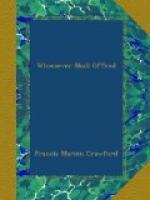CHAPTER XI
It was high summer again, and the Roman shore was feverish. In the hot afternoon Ercole had tramped along the shore with his dog at his heels as far as Torre San Lorenzo to have a chat with the watchman. They sat in the shade of the tower, smoking little red clay pipes with long wooden stems. The chickens walked about slowly, evidently oppressed by the heat and by a general lack of interest in life, since not a single grain of maize from the morning feed remained to be discovered on the disused brick threshing-floor or in the sand that surrounded it. From some dark recess came the occasional grunt of the pig, attending in solitude to the business of getting fat before October. Now and then the watchman’s wife moved a chair in the lower room of the tower, or made a little clatter with some kitchen utensils, and the sounds came out to the solitude sharply and distinctly.
There had been a flat calm for several days. Forty yards below the tower the sea lay along the sandy beach like a strip of glistening white glass, beyond which was a broader band of greenish blue that did not glitter; and beyond that, the oily water stretched out to westward in an unending expanse of neutral tints, arabesqued with current streaks and struck right across by the dazzling dirty-white blaze of the August sun.
Swarms of flies chased each other where the two men sat, settled on their backs and dusty black hats, tried to settle on their faces and were brushed away, crawled on the ground, on the walls, even on the chickens, and on the rough coat of Nino, the dog. He followed the motions of those he saw before him with one bloodshot eye; the other seemed to be fast asleep.
From time to time the men exchanged a few words. Ercole had apparently come over to enjoy the novelty of seeing a human being, and Padre Francesco, the watchman, was glad to talk with some one besides his wife. He enjoyed the title of “Padre,” because he had once been master of a small martingane that traded between Civita Vecchia and the south. In still earlier days he had been in deep water and had been boatswain of a square-rigger, yet there was nothing about his appearance now to show that he had been a sailor man. It was ten years since he had left the sea, and he had turned into a peasant.
Ercole had told Padre Francesco that the second hay crop had been half spoilt by thunderstorms; also that the price of wine in Ardea had gone up, while the price of polenta had remained the same; also that a wild boar had broken out of the king’s preserves near Nettuno and was supposed to be wandering in the brush not far away; also that if Ercole and Nino found him they would kill him, and that there would be a feast. Padre Francesco observed that his wife understood the cooking of wild boar with vinegar, sugar, pine-nuts, and sweet herbs, and that he himself knew how to salt the hams; he had also salted the flesh




